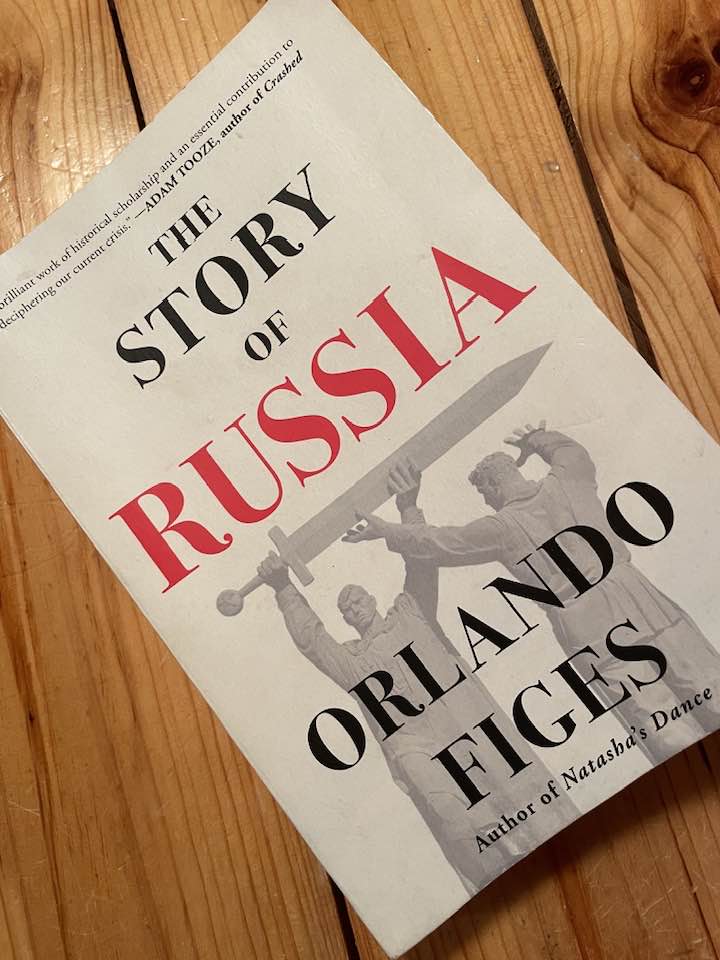JULY 14, 2024 – Today I finished reading The Story of Russia by Orlando Figes, a British scholar with serious academic chops and credentials. He’s written no fewer than nine books on Russian and European history, which have been translated into 30 languages. Yet, as is so often the case among academics, Figes has his detractors, I discovered, though in neither number nor effect that would undermine the validity of his thesis nor the support for it.
Me? As an armchair student of Russian history and therefore, sufficient grounding to follow The Story . . . with great interest, I found the book nothing short of riveting. So much so that it will be the very next book I read. Though the storyline, as it were—the “plot,” characters, and settings—were familiar to me, the deeper analyses and over-arching insights triggered a small case of regret . . .
After my sojourn in Russia in 1981 I’d toyed with the idea of putting my law degree aside and attending graduate school in Russian studies. Who knows where that crazy impulse would have led. A career in academia? The foreign service? Doing business in Russia?
Soon after the collapse of the Soviet Empire, my oldest sister introduced me to a Russian émigré, whose family lived in the same condo building as my sister’s family. At the time he happened to be studying how changes in policy at the Ex-Im Bank could enhance financing of American trade with Russia as the latter emerged from the collapse of the Soviet Union. Before I knew it, I was studying his academic work on the subject and co-authoring an article, which actually got published in the op-ed section of Newsday.
I digress. Back to reality. Back to what’s manifested as a lifelong extra-curricular interest—reading history; not teaching it, let alone making it. Given this abiding interest, I devoured the book, meaning that I read every page with my full undivided and “undestractable” attention.
As I mentioned in an earlier post, the book’s thesis is that Russian history—more so than the history of any other nation—has been shaped largely by the power of myth, perpetuated and enhanced by each successive generation so as to become an indelible aspect of the Russian psyche. Those central myths cover a range of overlapping chapters of the story, from national origins to Moscow’s status as the Third Rome to the perception of the Tsar (or Stalin!) as “little father” of the people to the impact of the Mongol invasions to Stalin’s rationale for entering into the Ribbentrop Pact.
Figes draws on these myths in analyzing Putin’s modus operandi, but where I found them most interesting, actually, was in understanding Stalin’s M.O., and more specifically, the reaction to Stalinism. Stalin’s reign was as brutal as any in recorded history, yet even its victims were apologists. To this day, he is regarded as a great leader, despite his atrocious record. Stalin was a master at myth making and manipulation, and he lorded over a people well-primed by a 1,000 years of history to “follow the leader.” He and they were a perfect match.
As I followed the myths and the realities of the story, I felt like a student of abnormal psychology peering into the inner psyche of a complex mind; of an obstinate genius that at times could be a complete idiot, incapable of learning from mistakes; a mind beset with an exceptional case of sociopathy, occasional schizophrenia, masochistic tendencies, a predilection for superstition and mysticism, all presenting as part of the same integrated malady; and a puzzling adoration of authority, even when that authority is the source of cruel and unusual punishment on a scale unimaginable by a Western mind.
If The Story of Russia teaches the Western reader one thing, it’s that we cannot begin to understand Russia today without knowing a lot about the Russia of yesterday. This axiom, of course, applies to any country or region of the world, but it applies especially to Russia, today in particular, given Putin’s war against Ukraine, as he aspires to reconstitute the Lost Empire.
Subscribe to this blog and receive notifications of new posts by email.
© 2024 by Eric Nilsson
